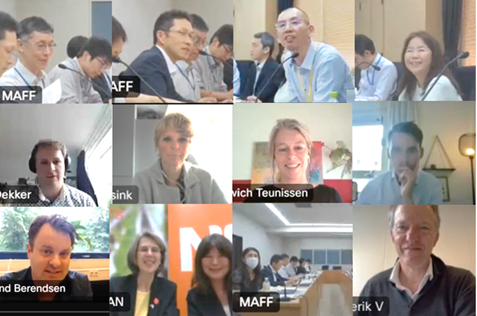Resilient crops take center stage in agricultural policy dialogue with Japan
On May 24, the 2nd subcommittee meeting of the 4th Japan-Netherlands dialogue on agricultural cooperation was held online. This time, the dialogue focused on the development of resilient crops in both countries. In addition to an exchange on policy development, participants shared information on various research projects tackling resilience from the angles of breeding technologies and the interaction between plants and micro-organisms. Multiple themes of common interest and potential for collaboration between Japan and the Netherlands were noted.

“Meeting successfully planted seed for bilateral collaboration on the topic of resilient crops.”
The subcommittee meeting provided an opportunity for representatives of the ministry of LNV and the Japanese farm ministry (MAFF) to compare notes on the policy-making concerning biotechnology, in particular genome-editing technologies. In light of the current EU discussion on New Breeding Techniques, it is particularly interesting that Japan already decided a few years ago to consider gene-edited organisms as conventional organisms (as opposed to living or genetically modified organisms) provided they do not contain DNA from other species. Products derived from gene-edited organisms are subject to different rules and thus Japan became the first country in the world with such products on its market (e.g. the GABA tomato).
At present, the regulatory framework in Japan offers better opportunities for the application of gene-editing technologies like CRISPR-CAS, for example to plant-breeding for resilience, beyond the scope of laboratory research than that in the EU. Still, the matter of social acceptance of gene-edited organisms and products derived from gene-edited organisms is also a challenge in Japan where, like in the EU, genetically modified (GM) foods find poor consumer acceptance and low public support. Consumer outreach activity is therefore also part of Japan’s genome-editing policy, consisting of public and private efforts at explaining the difference between gene-edited foods and GM foods to the general public and sounding out food companies’ views on the matter. These joint efforts would hopefully trump misinformation, which is a problem to both countries alike.
The subcommittee meeting further consisted of four presentations on resilient crops. From the Dutch side, Dr. Hedwich Teunissen, Managing Director of CropXR, gave a presentation on how data-driven design can aid the breeding of resilient or ‘flexible’ crops, combining artificial intelligence and machine learning with mechanistic models to advance breeding for complex traits. Dr. Roeland Berendsen, Assistant-Professor at Utrecht University, talked about the natural potential of plants and soils to ward off disease. His presentation featured the outcomes of a research project on the relationship between the root microbiome and plant resilience in potato tubers.
From the Japanese side, Dr. Ken Naito, Senior Researcher at the NARO Research Center of Genetic Resources, shared information on his research into how wild plants, that are able to survive under extreme conditions, actually perform and deal with stress. Learning from wild plants may provide crucial information on which genes are the most relevant to enhance plants’ stress tolerance.
Dr. Chiharu Akimoto, Deputy Leader of the Crop Stress Management Group at NARO, talked about the possibility of enhancing plant health by ensuring the availability of suitable microbiota in the soil, after having discovered that certain rice seed born bacteria could act as effective biocontrol agents against rice pathogens.
All presentations, including those on policy development, evoked the interest from the attending parties. Questions were asked back and forth, and suggestions were made for further research efforts. This subcommittee meeting was one of the most successful to date and has planted a seed for further collaboration on the important topic of resilient crops.
The next subcommittee meeting will take place on 24 June, and will focus on alternative proteins.
